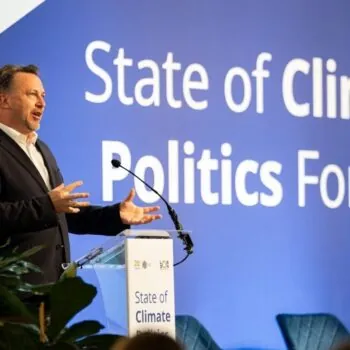Alongside delivering the European Green Deal as Europe’s new growth strategy, European Commission President Ursula von der Leyen has promised a more “geopolitical” Commission. While the latter may remain rhetoric, a more proactive and interest-driven Europe is starting to emerge.
In the wake of the COVID-19 crisis, the new concept of Europe’s “Open Strategic Autonomy” is coming to epitomize this shift.
For the EU-China relationship, this means leaning into a threefold approach to China, first laid out in 2019, as a negotiating partner, economic competitor and systemic rival. The EU did not shy away from asserting a proactive position on China in recent bilateral dialogues:
- highlighting disagreements – human rights concerns over Hong Kong and Uighur Muslims;
- pursuing alignment in areas where shared interests exist – trade and post-COVID-19 debt relief to third countries; and
- reaffirming willingness to engage if cooperation delivers concrete solutions – climate change.
EU-China relationships are under growing scrutiny from European parliaments. EU public perceptions of China are worsening. In this context, cooperation is only politically viable if the EU can clearly show that joint or aligned action leads to real change on the ground. Consequently, neither of the last two EU-China leaders’ meetings in 2020 ended with the usual joint declaration or the renewal of the fairly technocratic strategic agenda for cooperation.
Climate action – the linchpin for a new interest-driven China policy
At the EU-China leaders meeting on 14 September, both sides signalled their determination to coordinate on climate with the establishment of a high-level dialogue on climate change between European Commission Executive Vice-President Franz Timmermans and Chinese Vice-Premier Han Zheng. In a more multi-faceted relationship with China, climate action stands out as one of the few areas where European and Chinese interests are fundamentally linked.
Climate action is at the core of the EU’s strategic priorities. With it now enshrined in its European Green Deal agenda, it has become a strong component of its external policy identity.
China, the world’s largest emitter, can make or break European citizens climate safety. The pipeline of China’s coal and fossil infrastructure can single-handedly breach the 1.5 degree warming limit.
More broadly, the success of the EU’s climate goals requires the bloc to actively work with its partners to build resilient supply chains for carbon neutral technologies and shape the standards for a green economy. This includes China, who produces two-thirds of the world solar panels and accounts for almost half of electric vehicle sales globally.
It is in Beijing’s interests to raise China’s climate ambition to safeguard the country’s economic, energy and climate security.
China, is acutely vulnerable to climate change and its impacts are set to become increasingly disruptive to economic development. Floods in central China over the summer this year displaced 3.7 million people and pushed up food prices.
At the same time, continued investment in high-carbon industries, including coal, is incompatible with Beijing’s pursuit of a development pathway towards “Ecological Civilization”. China’s industrial strategy, including development of the low carbon sector, depends on maintaining open access to EU markets.
In the medium-term it is unclear whether China will choose a path of confrontation or re-invest in being a responsible power on the multilateral stage. For now, the Chinese foreign minister’s recent five-country tour of Europe shows the country is seeking to maintain global governance role. China is hedging against growing geopolitical tensions with the US, seeing Europe as a key partner.
Cooperation on global climate governance
The political space for EU-China cooperation on global climate governance will largely depend on what China brings to the negotiation table. The EU laid out what it considers credible Chinese climate action. These benchmarks are likely to be the focus of the new EU-China High-Level Dialogue on Environment and Climate:
- Commit to climate neutrality target; (the pre-briefing press conference added a “by 2060”)
- Bring forward the emissions peaking target from 2030 to an earlier date (2025 has been mentioned by EU officials);
- a moratorium in China of building coal-fired power plants and financing their construction abroad.
China is already taking a proactive step in addressing the EU’s benchmarks. Using the 75th UN General Assembly, President Xi announced China’s intention to peak emissions “before 2030” and achieve carbon neutrality “before 2060”.
The EU welcomed the move, indicating however that “a lot of work remains to be done”, hinting at the unaddressed issue of coal. The tango between the EU and China on climate ambition will continue at the forthcoming high-level dialogues. However, the signal from two of the world’s largest markets moving towards climate neutrality is likely to start impacting investors and other major emitters.
A proactive international agenda for a geopolitical Commission
The majority of European citizens support a proactive European agenda, rather than choosing sides in a major-power tug-of-war – particularly between the US and China. With US-China relations likely to remain strained irrespective of who wins the US election in November, European citizens’ values and interests are well served by an increasingly proactive and united Europe.
Recovery from the post-COVID-19 economic downturn provides an opportunity for the EU and China to explore coordinated effort in a number of areas including;
- trade and investment;
- debt relief for third countries; and
- the rules-based international order.
A shared vision on climate should give new impetus for joint actions on the following international agenda:
Debt restructuring to support developing countries to build back better
With a global recession looming, 2021 will be a critical year for defining debt settlement. It will also be crucial to whether countries have the fiscal space to invest in transition and resilience for climate stability. Beijing’s participation in the G20 Debt Suspension Initiative is a welcome sign.
The EU should work with like-minded partners and China to ensures coherent action by private, bilateral and multilateral financial institutions on debt relief for third countries. A strong and transparent international debt mechanism will reduce the risk of the debt conversation becoming a geopolitical pawn. Debt will be a test for both for the EU during the Italian G20 presidency, and for China’s willingness to support a multilateral approach when it holds a significant portion of developing country debt.
Developing standards to guide a global green recovery
A harmonised framework will allow policymakers and investors to align recovery funds with climate objectives. The European Sustainable Finance Taxonomy is one of the most advanced in the world. China kick-started international discussions on the topic under its 2016 G20 presidency. Recently it proposed changes to its green bond standard to exclude coal investments.
With a recent proliferation of taxonomies and approaches, a harmonized approach between two of the world’s largest economic blocs could be key to standardisation and a significant emissions reductions driver. This could be carried out through the International Platform for Sustainable Finance. The platform is a European-driven diplomatic effort with China as an active member. Alternatively this could be implemented through discussions in the G20 which will be hosted by Italy in 2021.
Managing the “Level Playing Field” through the recovery
As recovery funds flow into a new and clean economy it will be critical to manage the international conversations around subsidies and what constitutes a level playing field. Dialogues on carbon border adjustment mechanism between the EU, US and China should also commence at an early stage to mitigate the risk of trade disputes. Reinvesting and reforming the rules-based international trade system will only be possible if countries are honest about the impact of recovery funds on new economic sectors.
With a potential international resurgence of the US under a Biden Presidency and an increasingly assertive China, the EU has a limited time. Will the sparks of promise from its new approach to China be the dawn of a new Europe foreign policy or will they simply flame out?
This project has received funding from the LIFE Programme of the European Union.




